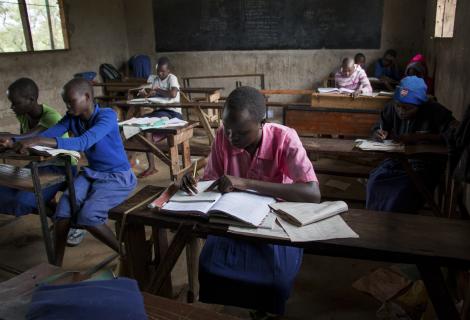
Over 18 million girls missing school in Africa as continent loses USD29 billion in education funding through flawed taxation
A staggering 18.8m girls are out of primary school in Africa according to a new report by the Tax and Education (TaxEd) Alliance and its allies. Each year, Africa loses US$29 billion in education finance due to excessively low tax rates and aggressive tax avoidance by the wealthiest companies and individuals. This amount is enough to put all 18.8 million girls back in school.
The Transforming Education Financing in Africa: A Strategic Agenda for the African Union Year of Education briefing reveals that sealing loopholes used for tax abuse, and ensuring fair, gender-responsive, taxation can raise an additional US$146 billion in Africa every year. An allocation of 20% (US$29.2 billion) of these additional funds to the education sector would be sufficient to cover costs for 25 million primary school children.
The report analyses the negative impact of regressive taxation policies, debt, and austerity on education funding in Africa.
Susan Otieno, the Country Director of ActionAid Kenya, said:
“It is appalling that there are over 18 million girls missing school in Africa when appropriate action by our governments to address gaps in taxation, debt, and austerity offers an opportunity to address this challenge.”
Additionally, the report shows that 28 of the 52 African Union countries studied are spending over 12% of their national budgets on debt repayment. 15 of these countries are already spending more on debt servicing than education.
Under the burden of the debt crisis, the International Monetary Fund has advised 96% of these countries to cut or freeze spending on public sector workers leading to cuts in salaries, and restrictions in hiring new staff, including teachers. This is likely to limit the countries’ budget allocations for education with dire consequences for learners and teachers.
Ashina Mtsumi, Coordinator of the Tax and Education Alliance, said:
“Women and girls bear the brunt of austerity and debt in Africa. Evidence suggests that austerity measures often have a disproportionately negative impact on girls' access to education, hindering their individual development and limiting their future opportunities.”
Solange Akpo, Regional Coordinator Africa Network Campaign on Education for All (ANCEFA), said:
“Decisive action is required on tax, debt, and austerity to transform education financing across Africa and to get the ball rolling towards inclusive and gender transformative education.”
Education International’s Africa Director, Dennis Sinyolo, said,
“African governments should take immediate policy, legislative and financing measures to end the teacher shortage. In line with EI’s Go Public! Fund Education campaign, we call on AU member states to ensure that every African child is taught by a qualified, supported and motivated teacher with decent salaries and working conditions”.
Aya Douabou, Programme Officer for Africa at the Global Initiative for Economic, Social and Cultural Rights (GI-ESCR), said:
“This briefing paper is highly timely and relevant as it proffers solutions to African States in helping them fulfil their human rights obligation to sustainably finance public education for all.”
The briefing urges African countries to strengthen sustainable, gender-responsive domestic financing for education by leveraging fair and progressive taxation, ending austerity, and insistence on urgent debt relief and much-needed reform to the global debt architecture.
REPORT KEY SUMMARY:
The African Union (AU) Year of Education in 2024 could make decisive breakthroughs to transform education systems if there is both coordinated national and Pan-African action on the key forces that impact on education financing: tax, debt, and austerity. The seeds have been laid by the bold and successful African initiative to demand a new UN Convention on International Tax Cooperation, shifting tax policy-making away from the OECD. Momentum can also be built from the Transforming Education Summit (TES) in September 2022 – which was the highest-level education meeting ever – convening Heads of States on an unprecedented scale to address the education crisis. The TES Call to Action on Financing Education marks a significant turning point in how discussions on education finance are framed. Africa can be in the forefront of delivering on this transformative finance agenda.
The AU Year of Education also presents an opportunity to advance the goals of the Continental Education Strategy for Africa (CESA) 2016 – 2025. While the region has made commendable progress to get learners into school and address inequality in education, significant disparities persist, exacerbated by the COVID-19 pandemic. The main drivers of education disparities in Africa are still gender, disabilities, household income, parental education, location, ethnicity, and migrant and refugee status, and people’s overlapping identities and experiences may further compound the challenges they face in accessing quality education.
Most education spending in Africa depends on domestic resource mobilisation. This briefing is based on a new analysis to show how breakthroughs on tax, debt, and austerity could transform education financing across the member states of the African Union and ensure inclusive, gender-transformative education.
List of organisations that have endorsed the report:
- ActionAid
- Africa Network Campaign on Education for All (ANCEFA)
- Centre for Economic and Social Rights (CESR)
- Coalition for Transparency and Accountability in Education (COTAE) Liberia
- Education International (EI)
- Global Alliance for Tax Justice (GATJ)
- Global Campaign for Education (GCE)
- Global Initiative for Economic, Social and Cultural Rights (GI-ESCR)
- Government Revenue and Development Estimations (GRADE) – Universities of St Andrews and Leicester
- Initiative for Social and Economic Rights (ISER)
- Oxfam
- Plan International
- Tax and Education (TaxEd) Alliance
- Tax Justice Network (TJN)
- Tax Justice Network – Africa (TJNA)
- World Organization for Early Childhood Education (OMEP)
- Young Urban Women Network
To contact the ActionAid Press Office email media-enquiries@actionaid.org or +263776665065.